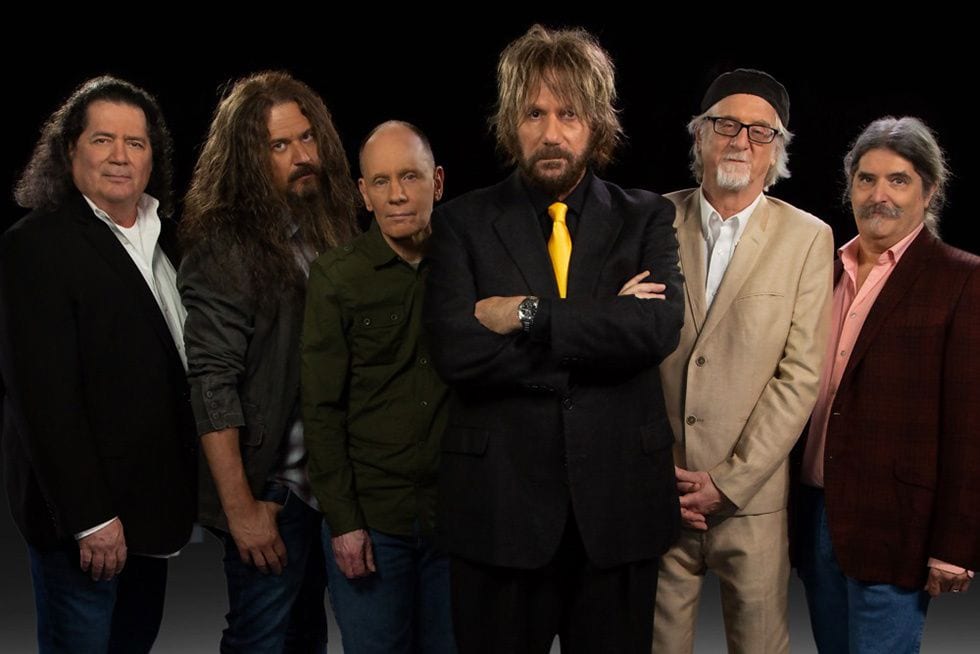West Virginia troupe Crack the Sky has always been among the most eclectic rock bands of their era. Founded in the early 1970s, their expansive catalog of over a dozen studio albums reveals a plethora of genre-melding classics that have sustained their sizable and deeply dedicated fanbase for nearly 45 years. In support of their two latest outings—a brand new studio collection called Living in Reverse and a compilation of reimagined classics called Crackology—the sextet adorned the Ardmore Music Hall in Ardmore, Pennsylvania on Sunday, 27 January. From start to finish, their staggering stamina and attention to detail were surprising and captivating, as was their focus on their oldest classics (thus, they blew away the crowd in terms of both performance and setlist). Frankly, few of today’s most youthful rock bands could hold a candle to the skill, variety, and enthusiasm Crack the Sky whipped up.
It’s a testament to their longevity and dedication that several original members remain, including songwriter/vocalist John Palumbo (who, despite being visibly and understandably weary while everyone else was energized, still sounded great), drummer Joey D’Amico, and guitarist Rick Witkowski. (Rounding out the line-up were longtime guitarist Bobby Hird, keyboardist Glenn Workman, and bassist Dave DeMarco.) While the venue was relatively small, it was completely packed with diehard enthusiasts; likewise, the lack of visual spectacle (outside of the token alternating colored lights) didn’t hurt the experience one bit. After all, the musicianship and songwriting were the focal points, and on that front, Crack the Sky astounding for nearly two and a half hours.
Naturally, they showcased Living in Reverse by pulling out “Talk Talk“, “Raining Rain”, and “Home Tonight”. Honestly, all three were somewhat generic, but the band nonetheless made them engaging enough with their sheer fervor and tightness (the former’s programmed backing was an interesting choice, too). Along the same lines, 1989’s title track “From the Greenhouse” and 2015’s “Rachel” impressed with intriguing harmonies and heartfelt verses, whereas the two cuts from 1980’s White Music—”Skin Deep” and encore cut “Hot Razors in My Heart”—brought some lively funk and downtrodden edge to the evening.
As enjoyable as those later tracks were, the true highlights of Crack the Sky’s arsenal were the gems from their first three LPs (1975’s Crack the Sky, 1976’s Animal Notes, and 1978’s Safety in Numbers). Specifically, “Nuclear Apathy” still astounds with its intricate central acoustic guitar motif, dizzyingly unstable arrangement, and multiple vocal sections (sung in part by D’Amico); in contrast, “Long Nights” and “Lighten Up McGraw” temptingly and sophisticatedly mellowed the mood a bit. The middle record’s “Animal Skins” found Palumbo wearing Dylan-esque black glasses while Hird, DeMarco, and Witkowski sat with acoustic instruments for a bit of arid psychedelia.
Unexpectedly, their introduction to the world (which Rolling Stone justly named “Debut Album of the Year”) got the greatest consideration via more than half of the sequence (such as “Hold On”, “Sea Epic”, “Robots for Ronnie”, “She’s a Dancer”, and “Mind Baby”). Easily the two standouts of the whole concert, however, were the astonishing extended editions of “Ice” and “Surf City” (the latter of which was spliced with several other tracks, like “I Don’t Have a Tie” and “We Want Mine”). The levels of skill and inventiveness displayed for both were nothing short of jaw-dropping, with each musician proving virtuosic at several points.
With their almost universally relentless showmanship and relatively unmatched repertoire (compared to their peers), Crack the Sky mesmerized all in attendance from beginning to end. While DeMarco, Witkowski, and Hird were the most overt technical stunners, all five instrumentalists were very impressive. As for Palumbo, his fairly fatigued presence took nothing away from his singing or the luster of his bandmates. All in all, they surely delivered on everything audience members wanted—and more—while demonstrating that sometimes it’s the veterans who still do rock music the best.


![Call for Papers: All Things Reconsidered [MUSIC] May-August 2024](https://www.popmatters.com/wp-content/uploads/2024/04/all-things-reconsidered-call-music-may-2024-720x380.jpg)



